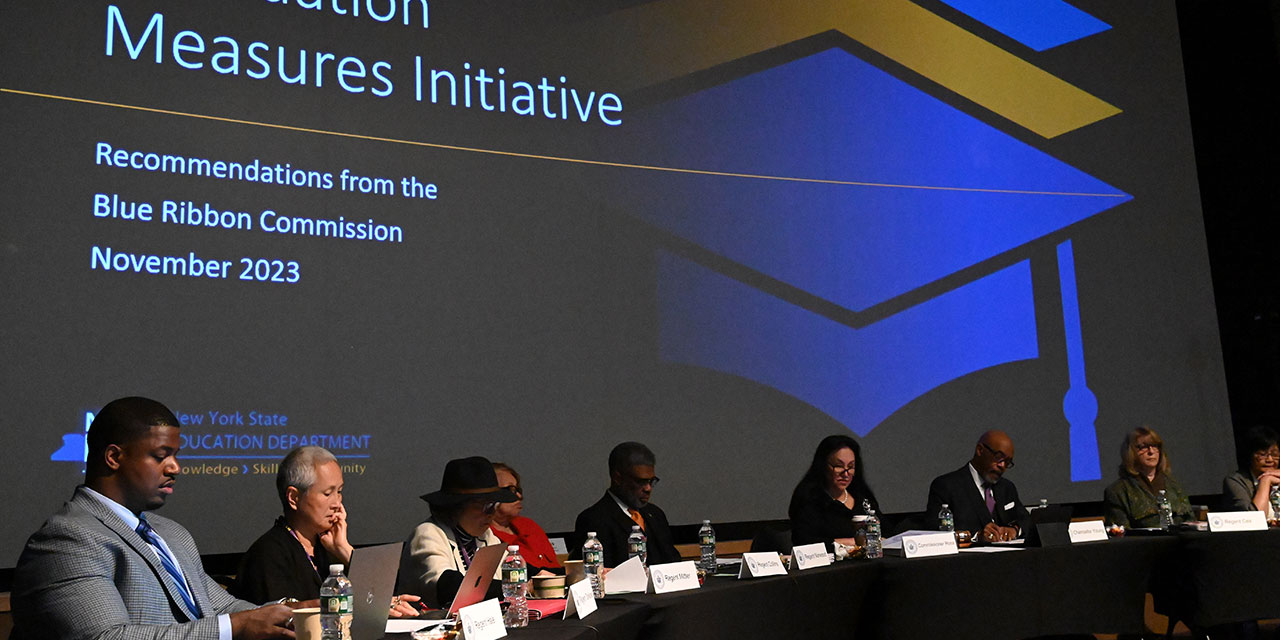
The New York State Board of Regents is eliminating its exam-based high school graduation requirements in the name of “equity.” The Regents exams, for decades a rite of passage for New York high schoolers, will become optional starting in the 2027–2028 school year. Students will instead be allowed to demonstrate “proficiency” through service projects, participation in the arts, or portfolios of artistic or scientific work.
Making the test optional is a mistake. It will deepen educational inequality and further erode healthy social norms. Without the requirement to show a solid academic foundation, more students will leave New York’s high schools unprepared for citizenship and productive adult lives. The Regents should return to basics: a content-rich curriculum, teacher-led instruction, and accountability through homework and exams.
The Regents’ reform agenda rests on what it calls four “transformations.” First, students will be judged against a new Portrait of a Graduate standard, which emphasizes critical thinking, social-emotional and cultural competence, and “global citizenship” over subject mastery. Second, traditional coursework will no longer be the standard for academic credits; students will be able to earn credits through work or service projects, participation in the arts, or career and technical programs. Third, as noted, the state will no longer require students to pass Regents exams to graduate. Finally, the three current diploma types—Regents, Regents advanced, and local—will be replaced by a single diploma for all graduates, with optional “seals” or endorsements added for further achievements.
Taken together, these transformations replace objective, comparable academic metrics with obscure, subjective ones. A diploma will no longer signal a baseline level of academic competence but instead report whatever alternative path the student finds most convenient and relevant for his particular interests. Far from raising standards, these four transformations threaten to render the very idea of a New York State diploma all but meaningless.
The “equitable” vision behind these changes, as the Regents define it, means equality of outcomes—not fairness or equality of opportunity. To progressive reformers, the solution to unequal outcomes isn’t to assist struggling students but to water down performance metrics. Based on the questionable recommendations of principal-turned-consultant Joe Feldman, some New York school systems—including the City’s—have already sought to eliminate teachers’ alleged implicit bias through “equitable grading,” which discourages issuing grades for homework or lowering grades for late work.
Such policies depart sharply from long-standing traditions in American education. For centuries, educators sought to enrich students’ minds and capacity for critical thinking while also familiarizing them with our shared national culture. According to Horace Mann, founder of the movement for free, universal public education, teaching “all ranks of society” to be effective “readers, writers, and speakers with a shared allegiance to the principles of equality and fairness would be the necessary foundation of a prosperous, stable nation.” By “equality,” Mann meant not equal outcomes but the principle of equal rights, as enunciated in the Declaration of Independence.
The Regents’ account of the purpose of education, by contrast, makes no reference to preparing students to exercise the rights and responsibilities of American citizenship. Rather, the Regents’ 2018 Culturally Responsive-Sustaining Education Framework, on which that account is based, calls for the promotion and perpetuation of alternative “cultures, languages and ways of knowing.” This departs from the traditional understanding that all U.S. residents, regardless of their background, should acquire a familiarity with American culture and history, along with fluency (written and oral) in the English language.
The Regents also propose shifting teaching methods toward affirming students’ “identities.” This downgrades the teacher’s traditional role as leader and instructor, along with the idea of a common body of knowledge that all students should master.
These changes are not new. Their roots stretch back more than a century to John Dewey’s “progressive” education movement. In recent decades, the push for “student-centered” education has come to mean “experiential” learning or “learning by doing,” rather than direct instruction.
Education departments in universities now commonly instruct future teachers that their role is to serve as a “guide on the side” rather than a “sage on the stage.” Students allegedly learn by “constructing” projects that are both “relevant” to the real world and compatible with their interests.
The trouble is this progressive approach hasn’t succeeded in promoting student learning. Between 1963 and 1982—the heyday of Dewey-style progressive education in teacher colleges—SAT scores sharply declined. An authoritative 1983 report, “A Nation at Risk,” issued by the nonpartisan U.S. National Commission on Excellence in Education, sounded the alarm: “The educational foundations of our society are presently being eroded by a rising tide of mediocrity that threatens our very future as a Nation and a people.”
In response, the standards-based reform-and-accountability movement came up with approaches like the federal No Child Left Behind Act (NCLB) of 2002. This movement sought to establish content-rich standards, hold schools and students accountable through testing, and assist underperforming schools. In the first decade after NCLB, student performance improved by at least five points in 22 states in fourth-grade reading and in 47 states in fourth-grade math.
Unfortunately, whether because of the slowness of the process of raising student achievement, resistance from the education establishment, or opposition from ostensible champions of racial equity, the political will to pursue further reform dissipated. The Regents’ changes mark a regression to a system in which academic achievement is an afterthought.
Public education should return to basics. Students should be taught a standard, content-rich curriculum designed to instill, in Matthew Arnold’s words, “the best that has been thought and said.” Teachers should lead orderly classrooms with clear expectations and consequences for misbehavior. And schools should be held accountable for student progress, just as students are held accountable for completing homework and performing on exams.
New York already has examples of this educational model. Success Academy’s 57 charter schools use a single curriculum for all their 22,000 students. Books are chosen for their high-quality, content-rich character, including the great texts of English literature. Teachers instruct students on the most important scientific concepts and the most important events of history. Parents and guardians sign a contract outlining their responsibilities, which include reading with their children every night, ensuring that homework gets done, and having their children attend school on time, every day.
The results speak for themselves. Success Academy students, on average, perform far better on standardized tests than their Department of Education counterparts, and even surpass peers in affluent suburban school systems.
From antiquity, great teachers have recognized that students can become habituated to the rewards of learning. The Regents’ changes, by contrast, will train them to settle for minimal effort and low standards, depriving them of the education that is their birthright.
Photo by Will Waldron/Albany Times Union via Getty Images















